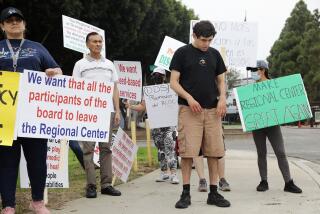Program Teaches a New Lesson in Life for Those With Cerebral Palsy : Education: Adult school aims at fostering learning among students who have been denied mainstream instruction because of disabilities.
- Share via
Rita Batcheler has cerebral palsy. But don’t think of her as a victim.
“I feel that people don’t do justice to the physically disabled,” the 56-year-old said Tuesday, speaking slowly and strongly from her quilt-covered wheelchair.
Batcheler is one of 29 people with cerebral palsy participating in an unusual program at the Conejo Valley adult school, designed to encourage and educate those who have been denied mainstream schooling because of their disabilities.
“What we have developed here is a program that takes the individual seriously and expects that he or she can produce and achieve goals,” program director Darrell Potts said.
Historically, programs for the disabled have focused on baby-sitting, not educating, he said. But that is not the case in Thousand Oaks, where the Adult Education-United Cerebral Palsy program has operated for eight years.
“A lot of programs like this have been shoved away to church basements and business complexes,” Potts explained. “Most people with cerebral palsy are intellectually fine. . . . (But) they have been left out of the educational loop.”
More than 700,000 people in the United States have cerebral palsy, a nervous system disorder that impairs motor functions such as speech and muscular movement. It is the most widespread lifetime disability in the nation.
United Cerebral Palsy of Los Angeles and Ventura Counties administers the program in Thousand Oaks in conjunction with the Conejo Valley Unified School District. It is funded by state and federal money.
Most of the program’s students--or “clients” as they prefer to be called--live in a cerebral palsy hostel in Westlake Village. Five days a week, they attend classes at the adult school from 10 a.m. to 4 p.m.
“We have a wide range of intellectual capabilities,” Potts said. “Some people are still working on numbers. On the other hand, we have a few who are taking classes at Moorpark College two days a week.”
Most participants attend exercise, language and computer classes each day. In the exercise class, men and women are able to leave their wheelchairs and roam the campus with the assistance of specially designed walkers.
In the computer class, the program’s clients learn to type using customized keyboards, some powered by mouthpieces or sensitive kneepads.
One unique aspect of the program is a volunteer work project, where participants work part-time jobs in the Thousand Oaks area.
Pam Runnfeldt, 41, works at Longs Drugs in Westlake Village every other Wednesday stocking shelves, a job she has enjoyed for the past eight months.
“I love it,” she said. “It makes me feel like I’m helping people.”
But in return, Runnfeldt wishes people would look beyond her disability to see her as a person. Her frustrations are renewed every time a child stops and stares at her wheelchair, she said.
“When they see me they ask their parents, ‘What’s the matter with her?’ ” she said. “It usually gets me upset, so I try to ignore it the best I can.”
The men and women in the program are extremely image conscious because they have been treated as children all their lives, Potts explained.
Movies and news articles often perpetuate those stereotypes. As a result, the program’s participants and staff members constantly strive to educate beyond the campus borders.
“They are dealt a label,” Potts said. “It creates untrue, negative images.”
More to Read
Sign up for Essential California
The most important California stories and recommendations in your inbox every morning.
You may occasionally receive promotional content from the Los Angeles Times.













